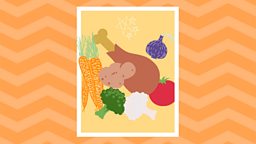How to feed your family for 拢20 a week: Eight tips from Lorna Cooper
How much do you spend a week on food for the family? According to the , our average weekly food bills come in at £60.60, with bread, fresh fruit and vegetables the most expensive.
Lorna Cooper, author of Feed Your Family For £20 A Week, cut her family’s weekly food bill from £100 to £20 after a back injury made her unable to work. She decided to share her tips and tricks for saving money on your food on a Facebook page and now more than 500,000 people are part of the Feed Your Family community.
Lorna joined Jane Garvey on Woman’s Hour to share ideas for planning and cooking inexpensive, yet delicious meals. Here are her top eight pieces of advice that will help feed a family of four for £20 a week...

1. Do batch cooking
“It doesn’t mean you have to spend all weekend cooking, it just means when you’re making a lasagne, make two and put one in the freezer. Same with curries, cottage pies etc. It means that on those days when you’re tired and you can’t be bothered and you would be tempted to stick a pizza in the oven or phone a takeaway, then you’ve got something there.”
When you鈥檙e making a lasagne, make two and put one in the freezer.Lorna Cooper
2. Buy in bulk
“Go to the farm shop and buy a sack of potatoes instead of buying small bags from the supermarket. If you don’t think you’ll use them all in time, or you don’t think you can afford to bulk buy, then consider asking your sister, your mum, your aunt, your friends at the school gates, your work colleagues even, if they want to chip in and do it that way.”
3. Bulk out meat dishes
“Instead of using 500g of mince to make a cottage pie, use 200g and 100g of porridge oats or red lentils and that bulks it out and also some grated veg. It’s a two-pronged attack - it means you’re bulking it out but also the kids don’t see the veg and complain.”
4. Learn to make basic sauces
“If you learn to make a basic white sauce and a basic tomato sauce, you can basically make any sauce. Your white sauce can become cheese sauce, pasta sauce, peppercorn sauce, anything. Your tomato sauce can become any of the pasta sauces that you see [in the supermarket]. It’s just a basic red sauce with a bit of garlic in it or mushrooms in it. You can also combine them to make creamy-based sauces.”

5. Avoid buying the expensive jars of dried herbs
“If you can, grow your own herbs. You can buy the wee plants from supermarkets, you can buy the seeds for pennies, but if you don’t feel confident taking them from a seed, you can buy the plants and just keep them on your window sill and keep them going through the year.
If you put an apple in with your potatoes, they don鈥檛 sprout.Lorna Cooper
“If you know of someone who has got a herb garden already, you can ask them if you can get a cutting and do that.
“I go to the Asian supermarkets for my herbs. You know you go to the supermarket and get your small jars which are about 50p to £1 each for 85g. You can go to the Asian supermarket and you can get 200g for £1.60 in a big bag.”
6. Learn how to store your food
“Your vegetables come from the supermarket in a plastic bag but you should take them out of the plastic bags. Hessian bags or brown paper sacks are the best for storing vegetables in. If you put an apple in with your potatoes, they don’t sprout - but don’t store them next to onions. I’m not sure of the science, but your onions make your potatoes sprout faster.
“Onions can keep forever. If you get a pair of tights and put an onion in one of the legs and twist it and put another onion in it and then twist it. You can keep them that way.”
7. Shop around
“A lot of people go to one supermarket and they just buy everything there. Shopping around in discount stores is good for dried food. Markets are really good for vegetables. Often you’ll find online that it’s easy to find vouchers or coupons for things. Freezer shops are really good sometimes and not just for freezer goods.”
8. Bake your own treats
“People often focus on their meals when they are trying to save money, but often it’s not your meals you’re spending your most money on, it’s your treats - biscuits and cakes and things to pad out your kids’ packed lunch boxes. Make your own treats. It’s not expensive.”
You can listen to the full interview with Lorna Cooper via the Woman's Hour podcast on 大象传媒 Sounds. You can follow us on and .



